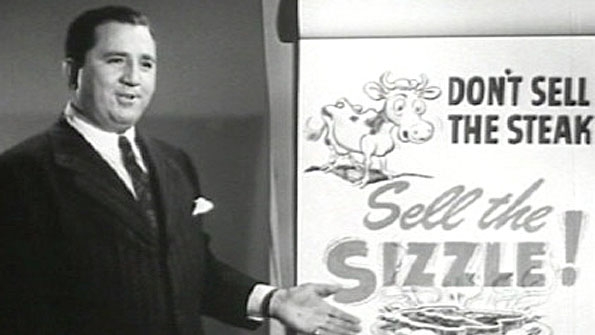'Sell the Sizzle, Not the Steak'
Published on February 17, 2015
Published on Wealthy Affiliate — a platform for building real online businesses with modern training and AI.

This blog post is meant for discussion. It's about advertising, which is an important part of our campaigns. There are some fine lines I need to have gone over and have tried to search on these things today. I have found very little about what I'm looking for.
This has to do with selling by using peoples' emotion. There are a number of things I know about and some apparent discrepancies. A little help from top online marketing performers on here absolutely welcome!
Using Buyers' Emotions to Sell the Goods
Top advertising experts insist that we should appeal to people's emotion when setting up our sales campaigns. I've read quite a bit of stuff on this today, appealing to what people feel about the car they're interested in, the dress she wants for her wedding, and so forth.
Many adverts enlist things like the following. Take this one-liner in a small advert from "Just for Men," which produces hair-coloring products. They have a great example of an advert that incites emotion...

The small print at the bottom reads, "The results of a 30-year scientific study of lions in the Serengeti National Park of Tanzania show that lionesses are more attracted to darker maned beasts."
This is found to be factual, and has been observed at this location, but humans are not lions and if there is any such study with humans in this regard, the producers of this advert doesn't make this known to us, or such studies do not exist.
There is no doubt that this advert 100 per-cent appeals to the emotion. How much of a good thing is this? Looking at WA's advertising, how much of it appeals to emotion? Does it at all?
Ready to put this into action?
Start your free journey today — no credit card required.
Note that the above advert, like most, and absolutely holds true 100 per-cent in rogue online products I've reviewed. In many cases, I've reviewed the advertising itself to show the insidious nature of it and the product itself. You rarely are told what a product is and what it does anymore. Some people call this "providing the benefits and not the more logical features of a product." Shouldn't there be a balance here?
Fallacy of Appeal to Emotion
To me, stuff like this is so seductive. It clouds reasoning on the basis of fear, pity, urgency, you name it. The above tells you nothing about what the product is or what it does. All it gives you is an apparent observation about lions, in highly effective manipulation of facts to get people, through emotion, to associate this product with a premise that men with light hair, who use this potion to darken it, get the women.
I see this kind of seduction so bad in many sales videos online that it is utterly harrowing. I've brought this up many times but I can see there is an extreme unfavourable reaction to it.
I realize that the most influential advertisers, speakers, orators, and other top promoters use this logical fallacy.
However, this also takes in, not the selling of a product being promoted, but dreams associated with it, the mansions, expensive cars, women, exotic beaches, yadda-yadda.
I also can see that there is, if there is any at all, an extremely low amount of such tactics used in Wealthy Affiliate advertising. Who is to say that NOT using such fallacies means less profit? Wealthy Affiliate has done just fine without it.
What I HAVE found is that a fallacy of emotion occurs when such an appeal replaces the rational argument altogether. This is key. If one is to present the rational argument, then it only follows that there will be needed the appeal to emotion to help support it. To leave the rational part of it out constitutes seduction and no substance. To have JUST the rational and not emotion produces a cold, monotonous argument.
My Observations
Today, I'm having a hard time finding those pre-launched JV invites that were once abundant. It seems that the recent rash of negative reviews on these pre-launches have spurred these unscrupulous marketers to take action by making their JV invitations unavailable until the last minute, or they have made these available only to known affiliates and not to the general public as they once were.
It has been these kind of reviews that have brought all of the online income I've had so far.
I've noted that this affects online marketing products with such things as SEO, affiliate marketing, social media marketing, and related campaigns. I've noted that things like Binary has not been affected in this way.
A definite observation to this is that I have noted the same kind of insidious techniques in advertising of scammy products are consistently throughout every such product I've reviewed.
There must be landmark training programs for the development of this type of campaign and this is what I'm looking for, so I can tear this apart and being at the source, be able to create evergreen content on this. The way in which these adverts are set up, especially video, seems to indicate it is coming from a common source.
It may not be wrong to appeal to human emotion in advertising but there certainly are ethical and unethical ways to go about it. It's this unethical agenda I'm after to infiltrate. If launch-jacking as I had it last year is no longer accessible, I have to find another way to get at it. Untold thousands of people every year, get scammed and taken in by such campaigns.
Any ideas, discussion, input on this most appreciated!
Share this insight
This conversation is happening inside the community.
Join free to continue it.The Internet Changed. Now It Is Time to Build Differently.
If this article resonated, the next step is learning how to apply it. Inside Wealthy Affiliate, we break this down into practical steps you can use to build a real online business.
No credit card. Instant access.